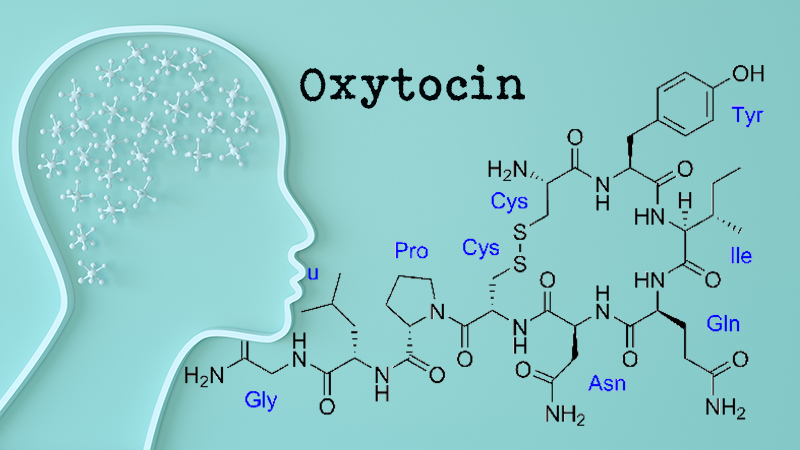If you’ve heard of oxytocin, you might know a little about its somewhat impressive reputation. Even if the name oxytocin doesn’t ring a bell, you might know this hormone by one of its other names: the love hormone, cuddle hormone, or bonding hormone.
As these nicknames suggest, oxytocin plays an important part in human bonding. Released during childbirth and breastfeeding, it’s a key factor in the bond between parent and infant.
Hugging, kissing, cuddling, and sexual intimacy can all trigger oxytocin production, which can strengthen bonds between adults, too.
These effects have led oxytocin to be grouped with the other happy hormones — hormones known to have a positive impact on mood and emotions.
It’s important to understand, however, that oxytocin doesn’t magically change your behavior. It doesn’t make you trust or fall in love with someone in an instant. But it can boost feelings of love, contentment, security, and trust toward someone you already care for.
Your body produces oxytocin naturally, but if you want to feel the love, so to speak, try these 12 natural ways to increase it.

1. Try yoga
This wellness practice offers plenty of benefits, including:
- less anxiety and stress
- relief from depression and other mood symptoms
- better sleep
- improved quality of life
But research from 2013Trusted Source suggests yoga may help increase oxytocin production, too.
This small study aimed to explore whether yoga could help increase oxytocin in people with schizophrenia, a mental health condition that often involves trouble recognizing facial emotions and other social difficulties.
According to the study results, the 15 participants who practiced yoga for 1 month saw improvements in their ability to recognize emotions and socio-occupational functioning. They also had higher levels of oxytocin. The researchers suggest that a link could exist between these findings, though their study didn’t find a correlation.
2. Listen to music — or make your own
While musical taste can vary widely from person to person, most people enjoy listening to some type of music.
You probably listen to music because you enjoy it, but you might have noticed it has other benefits, like improving your mood, focus, and motivation. It also seems to help improve the ability to create social bonds — an effect also associated with oxytocin.
Research is still limited, but a few small studies have found evidence to suggest music can help boost oxytocin levels in your body:
- A 2015 study asked four jazz singers to perform two different songs: one improvised, one composed. When the singers improvised, their oxytocin levels increased. The study authors suggest this happened because an improvised performance calls for strong social behaviors such as cooperation, trust, and communication.
- According to a 2009 studyTrusted Source, 20 open-heart surgery patients who listened to music while on bed rest had higher levels of oxytocin and felt more relaxed than patients who didn’t listen to music.
- In a 2003 studyTrusted Source of 16 singers, oxytocin levels increased in all participants after a singing lesson. The study participants also reported feeling more energized and relaxed.
You probably didn’t need another reason to turn up your favorite tunes, but here’s another good one!
3. Get (or give) a massage
Love a good massage? You’re in luck.
A 2012 studyTrusted Source looking at 95 adults found evidence to suggest 15 minutes of massage could not only help people relax, but it could also boost oxytocin levels.
Research from 2015 supports this finding and expands on it, noting that oxytocin levels also increase in the person giving the massage.
What does oxytocin do for you? Well, people often report less pain, stress, and anxiety post-massage. Many also notice an improved mood and greater feelings of well-being.
You don’t have to get a professional massage to see these benefits, either. Research suggests that massage from a partner or other loved one may work just as well.powered by Rubicon Project
4. Tell someone how much you care
Want to strengthen your emotional connection with others? Tell them how you feel.
Sharing your love and affection with the people who mean the most to you can help increase oxytocin in a few ways:
- Sharing your feelings with a loved one often leads them to reply in kind.
- Telling a friend or partner you love them can prompt a hug, hand squeeze, or kiss.
- Letting someone know how much you appreciate them can increase prosocial feelings on both sides.
5. Spend time with friends
Strong friendships can make a big difference in your emotional well-being. Kicking it with your pals can make for a good time, but it can also help you feel socially supported and less alone in the world.
That’s oxytocin at work. The good feelings you experience around your friends can help you feel more positive about your interactions, making you want to spend more time together. The trust and affection you have for them also tends to increase when you share their company more often.
Whether you make specific plans or simply enjoy hanging out, the more time you spend together, the stronger your bond will likely become.
PRO TIP
For an added bonus, try doing something with a friend that neither of you has done before. Bonding over the unique experience may also trigger oxytocin release.
Source:https://www.healthline.com/
